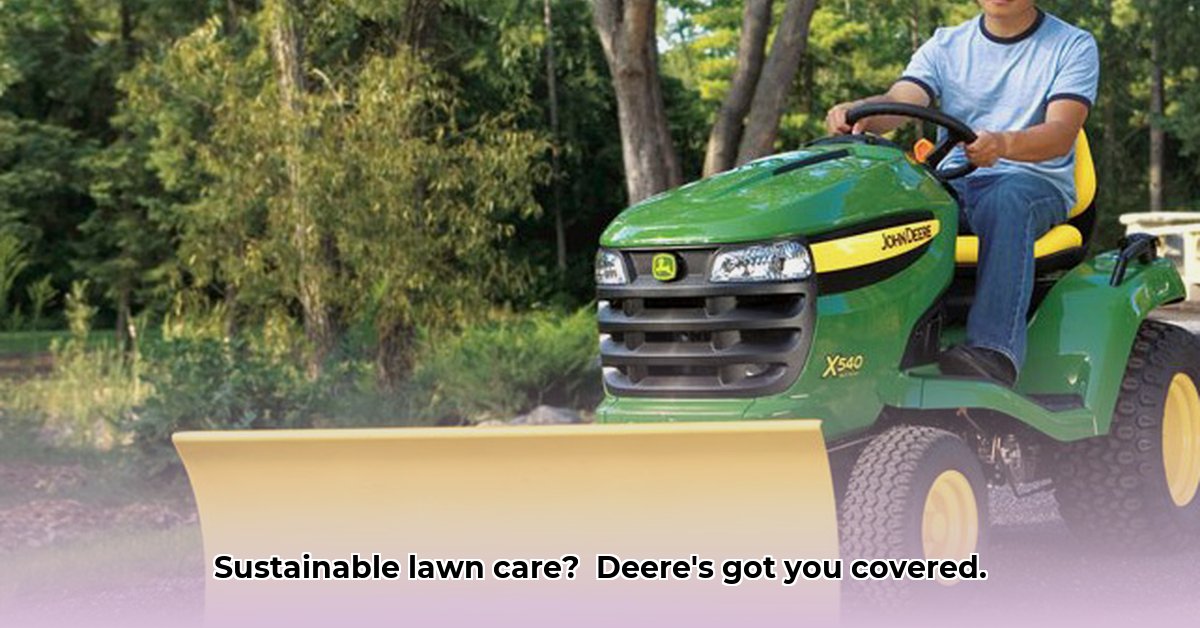
John Deere Lawn Tractor Tillers: Your Ticket to a Greener Lawn
Thinking about upgrading your lawn care routine while minimizing your environmental impact? John Deere lawn tractor tillers offer a powerful yet sustainable solution. This guide explores how these machines can help you create a healthier, more eco-conscious lawn. We'll cover selecting the perfect model, mastering efficient techniques, and understanding the long-term environmental benefits. For more information on tiller tines, check out this helpful resource.
Why Tilling Matters: Aerating Your Lawn for Healthier Growth
Imagine your soil as a compacted sponge. Tilling is like creating channels, allowing air, water, and essential nutrients to reach the grass roots more effectively. This revitalizes your lawn, leading to stronger, healthier growth and a more vibrant, resilient turf. It's a natural boost for your grass, making it better equipped to handle environmental stresses.
Choosing the Right John Deere Tiller: A Tailored Approach
Selecting the ideal tiller depends on several key factors. First, assess your yard's size. A small lawn requires less power than a sprawling acreage. Second, consider your soil type. Clay soil, for example, demands a more robust tiller than sandy soil. John Deere offers a wide range of models to suit diverse needs. Reading online reviews and comparing features like adjustable tilling depth and width before purchasing is essential.
Sustainable Yard Care: Minimizing Your Environmental Footprint
Sustainable landscaping is crucial for environmental responsibility. Here's how to use your John Deere tiller to minimize your environmental impact:
Mulching Magic: Instead of bagging grass clippings, leave them on the lawn. This acts as a natural fertilizer, reducing reliance on synthetic alternatives and minimizing waste. This natural approach provides essential nutrients, promoting healthier grass growth.
Strategic Tilling: Over-tilling can harm soil structure. Aim for fewer, deeper passes rather than numerous shallow ones. Consider exploring aeration as an alternative for less intensive soil preparation.
Regular Maintenance: Like any machine, regular maintenance ensures optimal performance and extends the tiller's lifespan. This reduces the need for premature replacements, contributing to less waste and long-term cost savings. A regular maintenance schedule saves you fuel and prevents unnecessary damage.
John Deere Lawn Tractor Tillers: A Balanced Perspective
Let's examine the advantages and disadvantages to provide a comprehensive understanding:
| Pros | Cons |
|---|---|
| Efficiency for large yards | Higher initial cost |
| Versatile attachments for various tasks | Requires ample storage space |
| Improved soil aeration and drainage | Can be cumbersome to maneuver in tight spaces |
| Reduced reliance on chemical fertilizers | Demands consistent maintenance for optimal function |
Beyond Tilling: Year-Round Utility and Versatility
The versatility offered by many John Deere models extends beyond just tilling. Attachments for tasks like snow removal in winter transform your tiller into a year-round asset, maximizing investment and improving overall efficiency.
Fuel Efficiency and Environmental Responsibility: Making Every Drop Count
While powerful engines efficiently tackle demanding tasks, they also consume fuel. Employ fuel-efficient mowing techniques, ensure regular maintenance, and consider the engine size relative to your lawn's size to optimize fuel consumption. A well-maintained tiller minimizes fuel waste significantly.
Cultivating a Sustainable Future: A Greener Approach to Lawn Care
Investing in a John Deere lawn tractor tiller can significantly contribute to sustainable yard maintenance. Responsible use and regular maintenance are key. By selecting the appropriate model and employing efficient techniques, you can create a healthy, beautiful lawn while minimizing your environmental impact.
Key Takeaways:
- Efficient tilling practices reduce fuel consumption and promote healthier soil.
- Mulching returns natural nutrients to the lawn, minimizing the need for chemical fertilizers.
- Regular maintenance significantly extends the tiller's lifespan, reducing waste and saving resources.
Dr. Emily Carter, Professor of Agricultural Engineering at Cornell University, notes, "Sustainable lawn care isn't merely a trend; it's a responsible approach. By choosing the right equipment and using it efficiently, homeowners can promote the health of their lawns while minimizing their environmental impact."